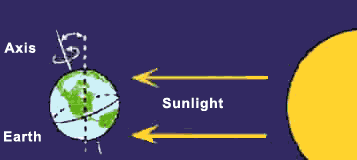BACKGROUND:
In the Solar System, the Earth is a unique planet. Its
surface has abundant liquid water, and supports a great diversity of life.
Another factor that makes the Earth special is that its seasons allow for
cold to hot climates which make living here just right for humans.
Seasons are caused by the tilt of the Earth's axis
which allows the Sun's rays to warm to cool the planet depending on the
angle of the Sun's rays.
 Many
people logically conclude that since we are warm in summer we are closer to
the Sun., but this is false. The seasons are caused by the positioning of
the Earth as it revolves around the Sun, and by the tilt of the Earth’s
axis. The Earth’s axis is tilted 23.5o from the vertical. This
means that solar energy strikes the Earth’s surface unevenly. It is summer
in the Northern Hemisphere when the North Pole tilts toward the Sun. This
puts the Sun more overhead, so solar energy strikes the Earth most directly.
Simultaneously, the Southern Hemisphere is experiencing winter, because the
Sun’s rays are least directly overhead. In half of a revolution (6
months), the North Pole tilts away from the Sun, making solar energy least
direct, so it is winter in the Northern Hemisphere, and summer in the
Southern Hemisphere. Fall and spring occur in between these two extremes
when the axis is tilted neither toward or away from the Sun.
Many
people logically conclude that since we are warm in summer we are closer to
the Sun., but this is false. The seasons are caused by the positioning of
the Earth as it revolves around the Sun, and by the tilt of the Earth’s
axis. The Earth’s axis is tilted 23.5o from the vertical. This
means that solar energy strikes the Earth’s surface unevenly. It is summer
in the Northern Hemisphere when the North Pole tilts toward the Sun. This
puts the Sun more overhead, so solar energy strikes the Earth most directly.
Simultaneously, the Southern Hemisphere is experiencing winter, because the
Sun’s rays are least directly overhead. In half of a revolution (6
months), the North Pole tilts away from the Sun, making solar energy least
direct, so it is winter in the Northern Hemisphere, and summer in the
Southern Hemisphere. Fall and spring occur in between these two extremes
when the axis is tilted neither toward or away from the Sun.
PROCEDURE:
- Have the students read Sunshine Makes the Seasons out loud.
- Ask the students if they think the book is informative about the
seasons. Ask them to comment on the pictures and the writing style. Ask
them each to find one good point and one bad point as they critique the
book.
- Ask the students what season is occurring in Australia if the United
States is having summer conditions (the answer is winter, because the
sunlight hits Australia least directly). If the students have read and
understood both books, they should be able to determine the answer.